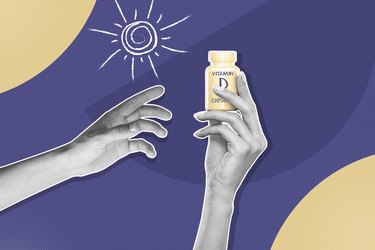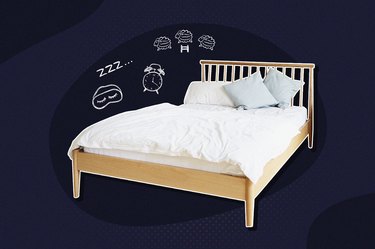
You've heard it time and time again: Get more sleep. We all know we should, but with such busy lives — working, raising a family, tending to chores — and distractions like social media, sleep often gets pushed to the back burner.
But experts aren't telling us to get more rest for nothing. Poor sleep can have a negative effect on nearly every part of the body.
Video of the Day
Video of the Day
That's why the American Academy of Sleep Medicine and the Sleep Research Society recommend adults get at least seven hours of sleep each night to promote optimal health. However, according to the Centers for Disease Control and Prevention (CDC), about 35 percent of adults don't reach that minimum.
And in fact, we seem to be getting less sleep these days than ever before: About a third of working adults got fewer than six hours of shut-eye a night in 2017-2018, per the CDC, up from 28 percent a decade before.
Here's what happens when you don't get enough sleep, including the head-to-toe effects on your body.
Your Brain Can't Keep Up
Your noggin is one of the most active parts of your body during slumber.
"While you're asleep, the brain is processing information that has been obtained during the day, forming new memories, solidifying things that you've learned that are important and also tossing out some things that aren't quite as important," says Carl W. Bazil, MD, PhD, director of the epilepsy and sleep division of the Department of Neurology at Columbia University Medical Center in New York City.
That's why pulling an all-nighter before a test or presentation tends to backfire. "You're cramming all this information in, but you don't really process it and retain it," he explains.
In short, you need rest to seal in the information you've learned. In fact, a March 2012 study in PLOS One showed that people who slept shortly after learning something were better able to recall the information later.
In addition, skimping on sleep can negatively affect your decision-making, problem-solving and the way you handle your emotions, according to the National Institutes of Health (NIH), which notes that sleep deficiency is also linked to depression, suicide and risky behaviors.
Plus, says Meena Khan, MD, a neurologist and sleep medicine specialist at The Ohio State University Wexner Medical Center, lack of shut-eye can decrease both your attention span and ability to concentrate.
Related Reading
Your Eyes Might Twitch
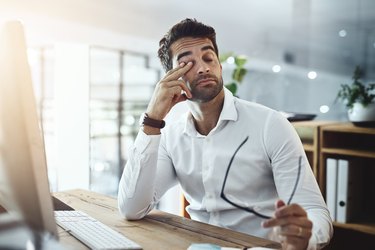
Missing your 40 winks can affect your peepers. In a small September 2013 study of 40 participants in Sleep, people who were deprived of sleep were rated as having more hanging eyelids, redder eyes, more swollen eyes and darker circles under the eyes than people who got eight hours of normal slumber.
But the effects of sleeplessness go beyond appearance.
"If sleep is disturbed and the muscles around the eye aren't allowed adequate rest, then eye spasms and twitches may occur," says Anil Rama, MD, a doctor of sleep medicine at the Stanford Center for Sleep Sciences and Medicine. While these symptoms don't affect vision, they can certainly be annoying.
More serious, obstructive sleep apnea, a condition in which breathing pauses throughout the night, can cause glaucoma and anterior ischemic optic neuropathy (an inflammation of the vessels of the eye), both of which can lead to blindness, says Dr. Rama.
"The hormone leptin suppresses hunger, and ghrelin stimulates appetite. If someone is sleep-deprived, it has been shown that leptin decreases and ghrelin increases, which could promote weight gain."
Your Nose May Run
If you find yourself craving junk food after a sleepless night, blame it on your nose. According to a small study of 29 people from October 2019 in eLife, when you're tired, your nose is more attuned to high-fat, calorie-dense food.
In the study, participants made healthy choices after a good night's sleep. But after getting just four hours of shut-eye another night, they reached for doughnuts, cookies and chips the next day.
Through MRI scans, the researchers found that the participants' brains were actually interpreting food smells differently after being sleep-deprived.
Too-little slumber could also be the culprit behind your runny nose. Why? When you're in dreamland, your body is strengthening your immune system so its infection-fighting cells and proteins can ward off foreign invaders (think: colds, the flu and other illnesses).
However, insufficient sleep disrupts the functioning of the immune system, so it won't do its job as well. Indeed, a September 2015 study in Sleep found that people who snooze for less than six hours a night are more likely to get sick when exposed to a cold virus. Worse, once you're ill, a lack of shut-eye can make it tougher to recover, according to the National Sleep Foundation.
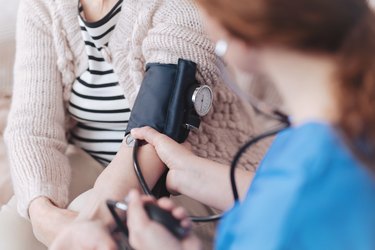
Your Heart Has to Work Harder
Blood pressure decreases during normal slumber. But if you're not getting enough sleep, your BP stays elevated for longer periods. This could lead to chronic hypertension, which is one of the leading risk factors for heart disease and stroke, according to the CDC.
What's more, it seems chronic lack of sleep can worsen outcomes for those with high blood pressure.
In one study, researchers monitored the sleep habits of 1,654 adults and then followed up with them nearly 20 years later. Their October 2019 results in the Journal of the American Heart Association showed that those with hypertension who slept less than six hours a night were twice as likely to die from heart disease or stroke.
Irregular sleep is an issue, too. Older adults who didn't have a consistent sleep schedule were nearly twice as likely to develop cardiovascular disease as those with more regular sleep patterns in a study of almost 2,000 people published March 2020 in the Journal of the American College of Cardiology.
Lack of zzzs can negatively affect the heart indirectly, too, by leading to unhealthy eating, high stress levels and decreased motivation to exercise — all of which can contribute to heart disease, per the CDC.
Indeed, a February 2020 study in the Journal of the American Heart Association found that, for women in particular, poor sleep quality is linked to poorer food choices (more added sugar and more calories overall), which increases the risk of heart disease.
Related Reading
Your Lungs Could Suffer
Too much or too little sleep may be a bane to your breathing. One December 2019 study in Proceedings of the National Academy of Sciences found that people who regularly get more than 11 hours or less than four hours of sleep at night are two to three times more likely to have pulmonary fibrosis, an incurable lung disease that makes it progressively harder to breathe.
Researchers found the link after studying UK Biobank data, which includes more than a half million people. In an effort to figure out the why behind the connection, they studied samples of human lung tissue and concluded that these less-than-ideal sleep patterns alter the production of collagen, which is a key protein in lung fibrosis.
Your Weight May Go Up
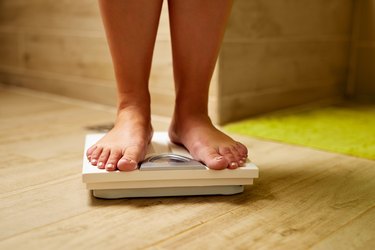
Researchers have begun to link lack of sufficient sleep and altered sleep habits to inflammation in the gut. One September 2019 study in Nature found that the brain's circadian clock has a strong effect on immune cells in the intestine responsible for healthy fat metabolism, and disrupting this clock can lead to inflammation and weight gain.
Indeed, in a very small April 2022 study of 12 people in the Journal of the American College of Cardiology, participants gained more weight and abdominal fat when their sleep was restricted to four hours than when they were allowed to sleep for nine hours.
Too little sleep can also cause you to overeat. In fact, insufficient time spent snoozing can lead to an increase in snacking after dinner and weight gain, per a February 2019 study in Current Biology.
"The hormone leptin suppresses hunger, and ghrelin stimulates appetite," says Dr. Kahn. "If someone is sleep-deprived, it has been shown that leptin decreases and ghrelin increases, which could promote weight gain."
Those hormonal changes are why you tend to be ravenous when you're short on shut-eye.
Even worse for your waistline, the lack of sleep isn't just linked to overeating — it causes you to crave specific kinds of junk foods, like cookies, candies and chips, according to the National Sleep Foundation.
In addition, your body doesn't do as good a job controlling blood sugar when you haven't gotten enough sleep. That puts you at higher risk of developing type 2 diabetes, according to the NIH.
Your Digestion Is Thrown Off
Insufficient snoozing can also lead to stomachaches and indigestion.
"Disturbed sleep causes bodily stress, which triggers blood and nutrients to be diverted away from the gut and to other parts of the body," says Dr. Rama. "That means whatever food is in your stomach won't face the normal acid and bile secretions, the contractions by the gut to move the food along will be reduced and absorption of the food will be delayed."
The result: constipation, diarrhea, bloating, flatulence, heartburn and pain.
Your Skin May Show the Effects
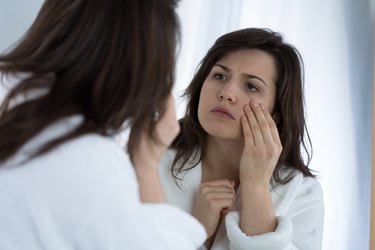
Beauty rest really is a thing. While you're snoozing, your skin is hard at work repairing cells that were damaged during the day. Insufficient sleep increases levels of inflammation and stress hormones, which can worsen skin problems like acne, eczema and psoriasis, according to the National Sleep Foundation.
And there's more: In the September 2013 Sleep study, the sleep-deprived people were described as having paler skin, more fine lines and wrinkles around the eyes and drooping at the corners of the mouth. In a similar study with 122 people, published May 2017 in Royal Society Open Science, people who hadn't gotten enough shut-eye for two consecutive nights were rated as less attractive.
Your sleep quality can even affect your pain perception. Sleep deprivation increases pain sensitivity by numbing the brain's painkilling response, according to a March 2019 study in the Journal of Neuroscience.
Your Libido Might Decline
Your sleep habits can affect your other bedroom activities. In a May 2015 study in the Journal of Sexual Medicine, women who got an extra hour of sleep were more likely to have sex the next day. On the flip side, women who don't get enough sleep may experience reduced libido, Dr. Rama says.
For men, the latter is also true. A lack of sleep can decrease testosterone levels, thereby reducing sex drive. In addition, poor sleep was associated with a reduction in sperm concentration and sperm count, according to a May 2013 study in the American Journal of Epidemiology.
Your Bones and Muscles Can't Heal
Human growth hormone is released during deep sleep and is responsible for building, repairing and maintaining muscles and bones. Too little sleep means muscle repair and healing will be impaired.
"Disturbed sleep is linked with low bone density, fractures and reduced skeletal muscle mass," says Dr. Rama.
Indeed, a November 2019 study in the Journal of Bone and Mineral Research that involved over 11,000 postmenopausal women found that sleeping five hours or less per night was linked to lower bone mineral density and osteoporosis.
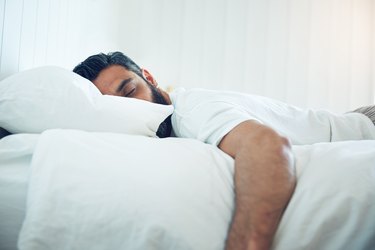
Healthy Sleep Tips
Knowing how poor sleep can negatively affect your body doesn't make it any easier to doze off. But the following tips can help you get the zzzs you need, according to the experts.
- Keep a consistent schedule. Go to bed and get up at the same time, even on weekends.
- Establish a bedtime ritual. Take a warm bath, practice meditation, do some light stretching or whatever helps you relax. This signals to your brain that it's time to wind down for sleep.
- Improve your sleep environment. Make sure your bed, pillows and bed covers are comfortable. Keep your room between 60 and 67 degrees (the ideal temperature range for sleep, according to the National Sleep Foundation). Use a fan or sound machine to drown out noise if necessary. Keep your room dark.
- Work out. Getting in some physical activity during the day can make it easier to fall asleep at night.
- Use your bedroom for two things only: sleep and sex. Move the computer, TV, smartphone and other distractions to another room.
- Avoid things that will keep you up at night, such as naps in the afternoon, caffeine, alcohol or a heavy meal late in the day.
- Talk with your doctor or a sleep professional if you're still having problems sleeping.
- Journal of Clinical Sleep Medicine: "Recommended Amount of Sleep for a Healthy Adult: A Joint Consensus Statement of the American Academy of Sleep Medicine and Sleep Research Society"
- Centers for Disease Control and Prevention: "Prevalence of Healthy Sleep Duration among Adults — United States, 2014"
- PLOS One: "Memory for Semantically Related and Unrelated Declarative Information: The Benefit of Sleep, the Cost of Wake"
- National Heart, Lung, and Blood Institute: "Sleep Deprivation and Deficiency"
- The Ohio State University Wexner Medical Center: "Meena Khan, MD"
- Sleep: "Cues of Fatigue: Effects of Sleep Deprivation on Facial Appearance"
- Sleep: "Behaviorally Assessed Sleep and Susceptibility to the Common Cold"
- Sleep.org: "How Losing Sleep Affects Your Body and Mind"
- Centers for Disease Control and Prevention: "How Does Sleep Affect Your Heart Health?"
- National Sleep Foundation: "How Sleep Improves Your Skin"
- Royal Society Open Science: "Negative effects of restricted sleep on facial appearance and social appeal"
- Journal of Neuroscience: "The Pain of Sleep Loss: A Brain Characterization in Humans"
- Current Biology: "Ad libitum Weekend Recovery Sleep Fails to Prevent Metabolic Dysregulation during a Repeating Pattern of Insufficient Sleep and Weekend Recovery Sleep"
- National Sleep Foundation: "The Connection Between Sleep and Overeating"
- The Journal of Sexual Medicine: "The Impact of Sleep on Female Sexual Response and Behavior: A Pilot Study"
- American Journal of Epidemiology: "Association of Sleep Disturbances With Reduced Semen Quality: A Cross-sectional Study Among 953 Healthy Young Danish Men"
- Sleep.org: "The Ideal Temperature for Sleep"
- American Academy of Sleep Medicine: "Find a Sleep Facility Near You"
- Journal of the American Heart Association: "Interplay of Objective Sleep Duration and Cardiovascular and Cerebrovascular Diseases on Cause‐Specific Mortality"
- Nature: "Light-entrained and brain-tuned circadian circuits regulate ILC3s and gut homeostasis"
- eLife: "Olfactory connectivity mediates sleep-dependent food choices in humans"
- Journal of Bone and Mineral Research: "Short Sleep Is Associated With Low Bone Mineral Density and Osteoporosis in the Women's Health Initiative"
- Proceedings of the National Academy of Sciences: "The circadian clock protein REVERBα inhibits pulmonary fibrosis development"
- Mayo Clinic: "Pulmonary Fibrosis"
- Journal of the American Heart Association: "Measures of Poor Sleep Quality Are Associated With Higher Energy Intake and Poor Diet Quality in a Diverse Sample of Women From the Go Red for Women Strategically Focused Research Network"
- Journal of the American College of Cardiology: "Actigraphy-measured Sleep Regularity and Risk of Incident Cardiovascular Disease: The Multi-Ethnic Study of Atherosclerosis"
- Centers for Disease Control and Prevention: "QuickStats: Percentage* of Currently Employed Adults Aged ≥18 Years Who Reported an Average of ≤6 Hours of Sleep† per 24-Hour Period, by Employment Category§ — National Health Interview Survey, United States, 2008–2009 and 2017–2018"
- Journal of the American College of Cardiology: "Effects of Experimental Sleep Restriction on Energy Intake, Energy Expenditure, and Visceral Obesity"
Is this an emergency? If you are experiencing serious medical symptoms, please see the National Library of Medicine’s list of signs you need emergency medical attention or call 911.

